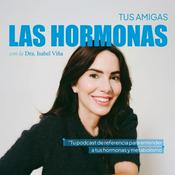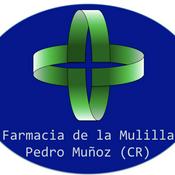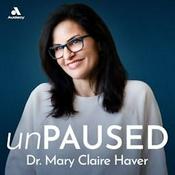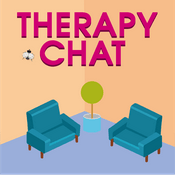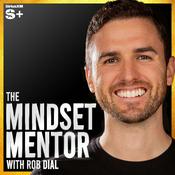The PedsDocTalk Podcast: Child Health, Development & Parenting—From a Pediatrician Mom
Dr. Mona Amin

Último episodio
376 episodios
Dr. Paul Offit on the State of Vaccines in America and What Parents Need to Understand Now
11/2/2026 | 51 minThis episode is one of the most important conversations I’ve had about vaccines. I sit down with a leading vaccine expert to slow down the noise and talk honestly about where we are right now in America. We discuss how vaccines went from one of the greatest public health successes in history to something many families feel unsure about, and what that shift means for children. This is not about politics or headlines. It’s about what I see as a pediatrician, what clinicians across the country are experiencing, and why protecting kids still has to be the center of the conversation.
We talk about fear, misinformation, and the very real consequences of falling vaccination rates. I share personal stories from training and practice that still stay with me, and we unpack how trust eroded, how Covid changed the landscape, and what parents deserve to understand moving forward. My hope is that this episode helps families step back from the chaos and reconnect with the core goal we all share: keeping children safe, healthy, and out of hospitals whenever we can.
What we discuss:
The current state of vaccines in America
Why vaccines are a victim of their own success
How misinformation spreads faster than evidence
Turning points that eroded public trust in vaccines
The impact of Covid on vaccine perception
Real clinical consequences of falling vaccination rates
Stories of vaccine-preventable illness from practice
Why personal choice affects community safety
Changes to vaccine recommendations and public messaging
What parents should understand about risk vs benefit
To connect with Paul Offit follow him on Instagram @pauloffitmd and check out all his resources at https://www.paul-offit.com/
00:00 Opening Message: The Real Risk of Skipping Vaccines
02:12 Meet Dr. Paul Offit
03:30 The Current State of Vaccines in America
05:04 Vaccines Are a Victim of Their Own Success
06:12 Why We Still Need Vaccines for “Rare” Diseases
08:27 Where Modern Vaccine Distrust Began (1982 Turning Point)
10:34 Pandemic Fallout and Vaccine Hesitancy
12:02 Frontline Stories from COVID
15:06 Denial in the Face of Evidence
17:11 How Vaccine Communication Should Change
19:00 Operation Warp Speed and Scientific Breakthrough
21:13 Politics and Public Health History
23:18 Measles Deaths Are Not “The Cost of Doing Business”
25:20 Medical Freedom vs Public Responsibility
28:23 Schedule Changes and Shared Decision Making
32:49 Life Before Rotavirus Vaccine
34:02 RSV Breakthroughs and Modern Progress
38:31 The Emotional Toll of Vaccine Misinformation
40:02 Residency Stories: When Prevention Fails
43:30 A Message to Vaccine-Hesitant Parents
45:35 What Keeps Dr. Offit Fighting
47:04 Final Takeaway: Vaccines Succeeded So We Forgot
Our podcasts are also now on YouTube. If you prefer a video podcast with closed captioning, check us out there and subscribe to PedsDocTalk.
Get trusted pediatric advice, relatable parenting insights, and evidence-based tips delivered straight to your inbox—join thousands of parents who rely on the PDT newsletter to stay informed, supported, and confident. Join the newsletter!
And don’t forget to follow @pedsdoctalkpodcast on Instagram—our new space just for parents looking for real talk and real support.
We love the sponsors that make this show possible! You can always find all the special deals and codes for all our current sponsors on the PedsDocTalk Podcast Sponsorships page of the website.
Learn more about your ad choices. Visit podcastchoices.com/adchoices- Motherhood can quietly shift the emotional balance in a partnership. In this conversation, we explore why resentment toward a partner is so common after having a baby and why it is not a personal failure, but a researched, predictable relationship stress point. The transition to parenthood often exposes invisible labor, unequal expectations, and emotional strain that many couples were never taught how to name, let alone fix.
We also talk about practical starting points for repairing connection. From making invisible labor visible, to changing how conflict is communicated, this episode focuses on teamwork, fairness, and ongoing conversations that prevent resentment from hardening into distance. The goal is not perfection or 50-50 equality, but shared understanding and intentional partnership.
What we discussed:
Why resentment often grows after becoming parents
The emotional and physical load many mothers carry
Research showing relationship dissatisfaction in the first year postpartum
How partnership dynamics affect postpartum mental health
The concept of making invisible labor visible
Dividing responsibilities in a way that feels agreed upon, not forced
Why equality is not always 50-50, but fairness still matters
Separating the partner from the problem
Communicating needs without blame or accusation
How suppressed resentment turns into bitterness
The value of weekly relationship check-ins
Addressing partners who resist conversations about workload
Explaining impact instead of arguing details
How shared labor improves emotional and physical intimacy
Why connection is built through everyday support, not grand gestures
Want more? Listen to the full, original episode.
Our podcasts are also now on YouTube. If you prefer a video podcast with closed captioning, check us out there and subscribe to PedsDocTalk.
Get trusted pediatric advice, relatable parenting insights, and evidence-based tips delivered straight to your inbox—join thousands of parents who rely on the PDT newsletter to stay informed, supported, and confident. Join the newsletter!
And don’t forget to follow @pedsdoctalkpodcast on Instagram—our new space just for parents looking for real talk and real support.
We love the sponsors that make this show possible! You can always find all the special deals and codes for all our current sponsors on the PedsDocTalk Podcast Sponsorships page of the website.
Learn more about your ad choices. Visit podcastchoices.com/adchoices - In this solo episode, I reflect on how parenting has changed since the 90s, and not always for the better. This episode is not about going backward or rejecting progress. It is about blending what we know now about emotions and development with what used to work well, giving kids space, time, and trust to grow.
I explore how constant comparison, nonstop information, overscheduling, and screens have shifted parenting toward fear and control, often leaving parents exhausted and kids overwhelmed. I share why boredom matters, why independence is built in small moments, and how parenting feels lighter when it is guided by values instead of perfection.
In this episode, I talk about:
Why independence is a skill kids build through small, age-appropriate freedoms
Why bullying feels heavier now, and how protecting home as a safe space matters
How overscheduling crowds out confidence, creativity, and rest
Why boredom is not a problem, but a skill kids need to practice
A values-based approach to screens, using them intentionally instead of automatically
Why errands, car rides, and everyday moments are real opportunities for growth
Why doing less can help both kids and parents feel calmer and more confident
00:00 Parenting Like It’s 1996
01:39 The Park Moment and Independence
02:56 Fear, Comparison, and Information Overload
05:45 Overscheduling and the Loss of Boredom
07:16 Screens Then vs Screens Now
11:15 Why Boredom Builds Confidence
13:00 Kids Belong in the Real World
13:58 What Parenting Has Improved
16:09 The Permission to Do Less
17:12 Letting Go of Perfect Parenting
Our podcasts are also now on YouTube. If you prefer a video podcast with closed captioning, check us out there and subscribe to PedsDocTalk.
Get trusted pediatric advice, relatable parenting insights, and evidence-based tips delivered straight to your inbox—join thousands of parents who rely on the PDT newsletter to stay informed, supported, and confident. Join the newsletter!
And don’t forget to follow @pedsdoctalkpodcast on Instagram—our new space just for parents looking for real talk and real support.
We love the sponsors that make this show possible! You can always find all the special deals and codes for all our current sponsors on the PedsDocTalk Podcast Sponsorships page of the website.
Learn more about your ad choices. Visit podcastchoices.com/adchoices - In this Follow-Up episode, Dr. Mona revisits one of the most stressful early parenting experiences, an inconsolable newborn. She breaks down what colic actually means, why the label is often misunderstood, and how to tell the difference between normal newborn fussiness and signs that need medical attention. The goal is not to dismiss crying, but to give parents a framework so they feel informed instead of brushed off.
Dr. Mona walks through what’s happening developmentally in those early weeks, why many babies hit a fussy peak around 6 weeks, and how to run a calm mental checklist at 2 a.m. She also covers red flags that deserve a pediatric visit, from fever to poor feeding to blood in the stool. Most importantly, this episode centers parents. Fussiness is common, phases pass, and support matters. You are not failing if your baby cries and you can’t fix it instantly. You are learning your baby in real time.
Key takeaways
✔️ Colic is a real pattern of crying, but it should never replace a thoughtful medical check
✔️ Most newborn fussiness peaks between 2 to 8 weeks and improves with time
✔️ Wet diapers, weight gain, and periods of calm are reassuring signs
✔️ Fever in a baby under 2 months always deserves a call to your pediatrician
✔️ Persistent crying with poor feeding, major spit up, or blood in stool needs evaluation
✔️ Not all crying is hunger, babies also cry from overstimulation and adjustment
✔️ Newborns are not spoiled by being held and comforted
✔️ Parents need pauses too, caring for yourself helps you care for your baby
Our podcasts are also now on YouTube. If you prefer a video podcast with closed captioning, check us out there and subscribe to PedsDocTalk.
Get trusted pediatric advice, relatable parenting insights, and evidence-based tips delivered straight to your inbox—join thousands of parents who rely on the PDT newsletter to stay informed, supported, and confident. Join the newsletter!
And don’t forget to follow @pedsdoctalkpodcast on Instagram—our new space just for parents looking for real talk and real support.
We love the sponsors that make this show possible! You can always find all the special deals and codes for all our current sponsors on the PedsDocTalk Podcast Sponsorships page of the website.
Learn more about your ad choices. Visit podcastchoices.com/adchoices - Potty training can feel smooth one day and completely off track the next. In this Follow Up episode of the PedsDocTalk podcast, Dr. Mona revisits a favorite potty training conversation while actively potty training her own youngest child and dealing with very real regressions.
Dr. Mona is joined by Allison Jandu, founder of The Potty Training Consultant, to break down readiness, timing, and how to choose a method that fits your child and your family. They talk through the average age for potty training, common signs of readiness, and why age alone should not drive the decision.
This episode compares gradual approaches and shorter weekend-style methods, explores why some kids resist even when they seem ready, and explains how pressure, timers, and rewards can sometimes backfire. You will also hear practical guidance on floor potties versus toilet seats, using daily routines to support learning, and helping kids feel more in control through play and choice.
If potty training feels confusing, frustrating, or messier than expected, this episode offers reassurance, perspective, and realistic support.
Want more? Listen to the full, original episode.
Our podcasts are also now on YouTube. If you prefer a video podcast with closed captioning, check us out there and subscribe to PedsDocTalk.
Get trusted pediatric advice, relatable parenting insights, and evidence-based tips delivered straight to your inbox—join thousands of parents who rely on the PDT newsletter to stay informed, supported, and confident. Join the newsletter!
And don’t forget to follow @pedsdoctalkpodcast on Instagram—our new space just for parents looking for real talk and real support.
We love the sponsors that make this show possible! You can always find all the special deals and codes for all our current sponsors on the PedsDocTalk Podcast Sponsorships page of the website.
Learn more about your ad choices. Visit podcastchoices.com/adchoices
Más podcasts de Salud y forma física
Podcasts a la moda de Salud y forma física
Acerca de The PedsDocTalk Podcast: Child Health, Development & Parenting—From a Pediatrician Mom
The PedsDocTalk Podcast is your go-to parenting resource, hosted by Dr. Mona Amin, a trusted pediatrician, parenting expert, and mom of two. As a top 30 Parenting Podcast in the U.S., this show delivers expert-backed guidance on child development, health, illness, behavior, feeding, and sleep—giving parents the confidence to navigate every stage from baby to teen.
Each episode dives into real-life parenting challenges, featuring conversations with specialists in pediatrics, child psychology, nutrition, and parental well-being. From potty training and sleep training to tackling tantrums, picky eating, discipline, screen time, postpartum recovery, and developmental milestones, Dr. Mona provides practical, science-backed advice that actually works.
Tune in on Mondays and Wednesdays for actionable insights, mindset shifts, and expert interviews that empower you to raise healthy, resilient, and happy kids—while thriving as a parent yourself!
Sitio web del podcastEscucha The PedsDocTalk Podcast: Child Health, Development & Parenting—From a Pediatrician Mom, El podcast de Cristina Mitre y muchos más podcasts de todo el mundo con la aplicación de radio.es

Descarga la app gratuita: radio.es
- Añadir radios y podcasts a favoritos
- Transmisión por Wi-Fi y Bluetooth
- Carplay & Android Auto compatible
- Muchas otras funciones de la app
Descarga la app gratuita: radio.es
- Añadir radios y podcasts a favoritos
- Transmisión por Wi-Fi y Bluetooth
- Carplay & Android Auto compatible
- Muchas otras funciones de la app


The PedsDocTalk Podcast: Child Health, Development & Parenting—From a Pediatrician Mom
Escanea el código,
Descarga la app,
Escucha.
Descarga la app,
Escucha.




